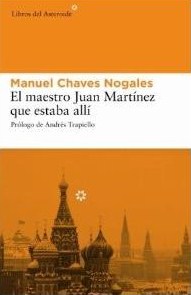Manuel Chaves Nogales
El maestro Juan Martínez que estaba allí

My edition is by Libros del Asteroide publishers. Very neat (as much as expensive).
Chaves Nogales is considered by some the greatest journalist writer from Spain, after Larra. It may be true. This is the first book I read by him and it's simpy great. It's a novel, but only in format. His stlye is informative, full of action and to the point; plain and simple journalistic style, no fooling around with and no political partisanship: The narrator wants to tell us what he's seen, more than what he's felt. This is key.
I came up with this writer following Josep Pla's chronicles of the Second Republic in Spain, a wonderful way to learn history as it developed; and also Julio Camba's little journalistic style books of the same era. The three of them (plus another) have been compiled together into one immense tome titled: Four Histories of the Second Republic. I love their writing styles, there's no way one can get bored or sleepy. It's like a machine gun shooting into your mind fresh images of daily life in the cities and towns of our troubled political scene (in Spain).
The story's protagonist really existed. He told his friend (the author) about his travels over Europe and in Russia during the Commies' revolution. Chaves Nogales put them together in this book. The traveller is a flamenco artist and guitarist. He travels give us the chance to see what was going on (really) in those critical years, from the point of view of a common middle class man. It's delicious, worth the price I paid.
It's great to read a book about the Bolshevik revolution that is not a history or political study, but is accurate and also a literary gem.
